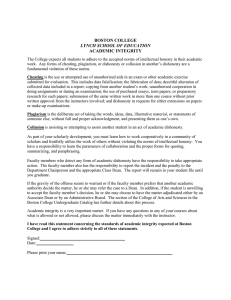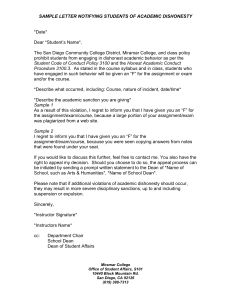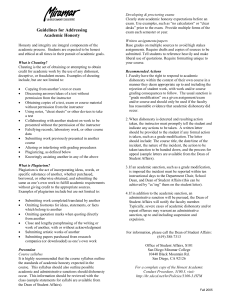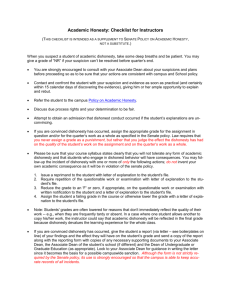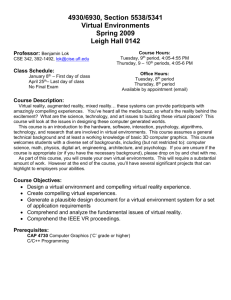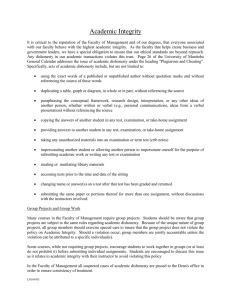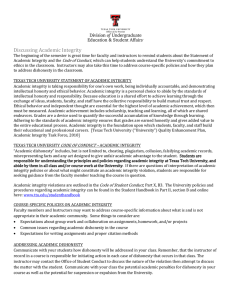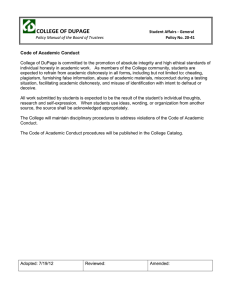Together we envision a positive learning environment that promotes the... ideas by practicing civility and ethical learning behaviors.
advertisement
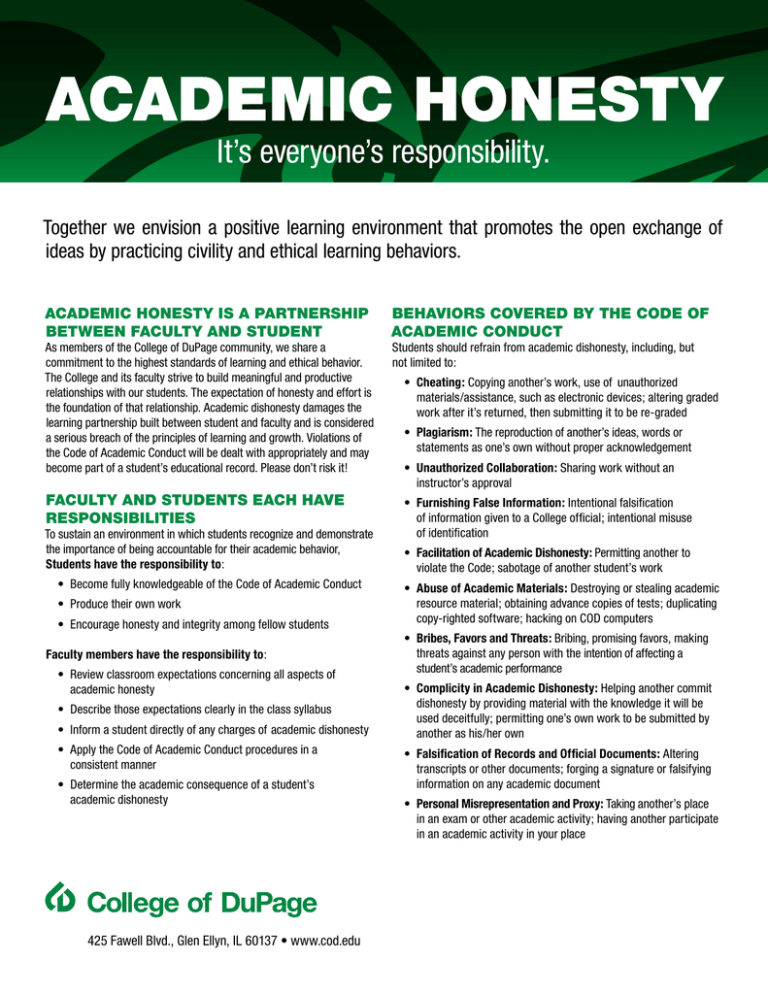
It’s everyone’s responsibility. Together we envision a positive learning environment that promotes the open exchange of ideas by practicing civility and ethical learning behaviors. Academic Honesty is a Partnership between Faculty and Student As members of the College of DuPage community, we share a commitment to the highest standards of learning and ethical behavior. The College and its faculty strive to build meaningful and productive relationships with our students. The expectation of honesty and effort is the foundation of that relationship. Academic dishonesty damages the learning partnership built between student and faculty and is considered a serious breach of the principles of learning and growth. Violations of the Code of Academic Conduct will be dealt with appropriately and may become part of a student’s educational record. Please don’t risk it! Faculty and Students Each Have Responsibilities To sustain an environment in which students recognize and demonstrate the importance of being accountable for their academic behavior, Students have the responsibility to: • Become fully knowledgeable of the Code of Academic Conduct • Produce their own work • Encourage honesty and integrity among fellow students Faculty members have the responsibility to: • Review classroom expectations concerning all aspects of academic honesty • Describe those expectations clearly in the class syllabus • Inform a student directly of any charges ofacademic dishonesty • Apply the Code of Academic Conduct procedures in a consistent manner • Determine the academic consequence of a student’s academic dishonesty 425 Fawell Blvd., Glen Ellyn, IL 60137 • www.cod.edu Behaviors Covered by the Code of Academic Conduct Students should refrain from academic dishonesty, including, but not limited to: • Cheating: Copying another’s work, use of unauthorized materials/assistance, such as electronic devices; altering graded work after it’s returned, then submitting it to be re-graded • Plagiarism: The reproduction of another’s ideas, words or statements as one’s own without proper acknowledgement • Unauthorized Collaboration: Sharing work without an instructor’s approval • Furnishing False Information: Intentional falsification of information given to a College official; intentional misuse of identification • Facilitation of Academic Dishonesty: Permitting another to violate the Code; sabotage of another student’s work • Abuse of Academic Materials: Destroying or stealing academic resource material; obtaining advance copies of tests; duplicating copy-righted software; hacking on COD computers • Bribes, Favors and Threats: Bribing, promising favors, making threats against any person with the intention of affecting a student’s academic performance • Complicity in Academic Dishonesty: Helping another commit dishonesty by providing material with the knowledge it will be used deceitfully; permitting one’s own work to be submitted by another as his/her own • Falsification of Records and Official Documents: Altering transcripts or other documents; forging a signature or falsifying information on any academic document • Personal Misrepresentation and Proxy: Taking another’s place in an exam or other academic activity; having another participate in an academic activity in your place Students Accused of Academic Dishonesty are entitled to Due Process It is a faculty member’s responsibility to make judgments about students’ academic performance. If an irregularity is discovered, the faculty will notify the student, either orally or electronically, to request a meeting. The outcome of this Informal Hearing may be: • Learning Opportunity: If it is determined the violation is unintended, the faculty may offer a chance to advance the student’s learning and not impose a sanction. If the student refuses the opportunity, the faculty may file a complaint with the Dean of Student Affairs. • For Information Only: If the student accepts responsibility for the violation, faculty will impose the appropriate academic sanction; file a request with the Dean of Student Affairs to record the matter in the judicial database; no further action will be required. Formal Resolution of a Code of Academic Conduct Violation If a student denies complicity in an act of academic dishonesty or when prior methods of closure were not effective, students will be afforded the due process of a Formal Judicial Hearing. The faculty will submit a description of the violation to the Dean of Student Affairs, who will put the student’s registration on temporary hold, notify the student in writing of the hearing and set a mutually agreeable date. During the hearing the complaint and Code of Academic Conduct procedures will be reviewed. The student will have a chance to present evidence and make statements. At the conclusion of the hearing, if it is determined no academic dishonesty has occurred, no sanction will be assigned. Sanctions for Violations of the Code of Academic Conduct If it is determined a Code of Academic Conduct violation has occurred, the Dean of Student Affairs will assign one or more of the following sanctions, based upon the nature of the violation. 1. Plagiarism Remediation 2. Disciplinary Warning 3. Disciplinary Probation 4. Disciplinary Loss of Privileges 5. Withdrawal from Class 6. Limited Access 7. Disciplinary Suspension 8. Extended Disciplinary Suspension 9. Expulsion 10.Community Service Appeal Rights and Process A student wishing to appeal a Formal Judicial Hearing outcome must do so in writing to the Vice President, Student Affairs, within 14 days of the date recorded on the Case Resolution Form. A standing Judicial Review Board will hear testimony and make appropriate disciplinary recommendations. The decision of the Judicial Review Board will be final. In most instances disciplinary matters are kept confidential to the extent required by law. Disciplinary records are maintained by the Office of the Dean of Student Affairs for a period of seven years. 8 Cardinal Rules for Academic Integrity 1.Know Your Rights. Do not let other students in your class diminish the value of your achievement by taking unfair advantage. Report any academic dishonesty you see. 2.Acknowledge Your Sources. Whenever you use words or ideas that are not your own when writing a paper, use quotation marks where appropriate and cite your source in a footnote, and back it up at the end with a list of sources consulted. 3.Protect Your Work. In examinations, do not allow your neighbors to see what you have written; you are the only one who should receive credit for what you know. 4.Avoid Suspicion. Do not put yourself in a position where you can be suspected of having copied another person’s work, or of having used unauthorized notes in an examination. Even the appearance of dishonesty may undermine your instructor’s confidence in your work. 5.Do your own work. The purpose of assignments is to develop your skills and measure your progress. Letting someone else do your work defeats the purpose of your education, and may lead to serious charges against you. 6.Never falsify a record or permit another person to do so. Academic records are regularly audited. Students with altered grades put their entire transcript at risk. 7.Never fabricate data, citations, or experimental results. Many professional careers have ended in disgrace; even years after the fabrication first took place. 8.Always tell the truth when discussing your work with your instructor. Attempts to deceive may destroy the student/teacher relationship. Reprinted with permission of Northwestern University, From Academic Integrity: A Basic Guide More Information For more information on the Code of Academic Conduct or to obtain additional brochures, contact: Office of the Dean of Student Affairs Student Services Center (SSC), Room 3200 (630) 942-3224 or (630) 942-2485 deanofstudents@cod.edu
